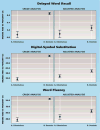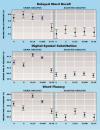Cross-sectional associations of oral health measures with cognitive function in late middle-aged adults: a community-based study
- PMID: 24282266
- PMCID: PMC4955404
- DOI: 10.14219/jada.archive.2013.0072
Cross-sectional associations of oral health measures with cognitive function in late middle-aged adults: a community-based study
Abstract
Background: It has not been established to what extent oral health is associated with cognitive function in late middle-aged adults. In this study, which is part of the national Atherosclerosis Risk in Communities (ARIC) study, the authors investigated whether tooth loss and periodontitis are associated with lower cognitive function.
Methods: The authors analyzed ARIC data measuring cognitive function in 11,097 participants from 1996 through 1998 according to tests of delayed word recall, digit-symbol substitution (DSS) and word fluency; 9,874 participants answered dental screening questions. Of the 8,554 dentate participants, 5,942 received oral examinations. The authors used measures of dental status, number of teeth and periodontitis (classified according to the Biofilm-Gingival Interface Index) in multiple linear regression models to estimate these factors' cross-sectional association with cognitive scores, adjusting for sociodemographic factors, cigarette smoking, alcohol use and diabetes.
Results: Approximately 13 percent of participants were edentulous. Of the dentate participants, 27.3 percent had fewer than 20 teeth and 12.4 percent had pocket depth of 4 millimeters or more with severe bleeding. Compared with dentate participants, edentulous participants had lower scores for all cognitive tests. Among the dentate participants, having fewer teeth and gingival bleeding were associated with lower DSS and word fluency test scores, although periodontal pocket depth was not.
Conclusions: In this cohort, edentulism was correlated with lower cognitive status. Tooth loss and gingival bleeding were markers of poorer executive function among dentate people. Practical Implications. The association of lower cognitive scores with edentulism suggests that past oral diseases may be a risk indicator for cognitive decline, whereas the association with gingival inflammation indicates a possible effect of cognitive decline on oral health. Practitioners should be aware that both current and historical markers of oral disease might be associated with decline in cognitive function, even in adults of late middle age.
Keywords: Cognitive function; gingivitis; periodontitis; tooth loss.
Figures


Comment in
-
Cognitive function.J Am Dent Assoc. 2014 Apr;145(4):326-7. doi: 10.1016/s0002-8177(14)60002-7. J Am Dent Assoc. 2014. PMID: 24686961 No abstract available.
-
Authors' response.J Am Dent Assoc. 2014 Apr;145(4):327. doi: 10.1016/s0002-8177(14)60003-9. J Am Dent Assoc. 2014. PMID: 24686962 No abstract available.
References
-
- Alzheimer’s Association. 2012 Alzheimer’s facts and figures. Alzheimers Dement. 2012;8(2):131–168. - PubMed
-
- Batty GD, Li Q, Huxley R, et al. VANCE Collaborative Group Oral disease in relation to future risk of dementia and cognitive decline: prospective cohort study based on the Action in Diabetes and Vascular Disease: Preterax and Diamicron Modified-Release Controlled Evaluation (ADVANCE) trial. Eur Psychiatry. 2013;28(1):49–52. - PMC - PubMed
-
- Yamamoto T, Kondo K, Hirai H, Nakade M, Aida J, Hirata Y. Association between self-reported dental health status and onset of dementia: a 4-year prospective cohort study of older Japanese adults from the Aichi Gerontological Evaluation Study (AGES) project. Psychosom Med. 2012;74(3):241–248. - PubMed
Publication types
MeSH terms
Grants and funding
- N01 HC055019/HL/NHLBI NIH HHS/United States
- N01 HC055021/HL/NHLBI NIH HHS/United States
- N01-HC55015/HC/NHLBI NIH HHS/United States
- N01 HC055015/HL/NHLBI NIH HHS/United States
- N01 HC055020/HL/NHLBI NIH HHS/United States
- N01-HC 55021/HC/NHLBI NIH HHS/United States
- N01-HC 55018/HC/NHLBI NIH HHS/United States
- N01 HC055022/HL/NHLBI NIH HHS/United States
- N01-HC 55016/HC/NHLBI NIH HHS/United States
- N01-HC 55019/HC/NHLBI NIH HHS/United States
- N01 HC055016/HL/NHLBI NIH HHS/United States
- R01 DE011551/DE/NIDCR NIH HHS/United States
- N01 HC055018/HC/NHLBI NIH HHS/United States
- N01-HC 55022/HC/NHLBI NIH HHS/United States
- DE 13807-01A1/DE/NIDCR NIH HHS/United States
- N01-HC 55020/HC/NHLBI NIH HHS/United States
- N01 HC055018/HL/NHLBI NIH HHS/United States
- DE1 1551/DE/NIDCR NIH HHS/United States
LinkOut - more resources
Full Text Sources
Other Literature Sources
Medical
Miscellaneous

